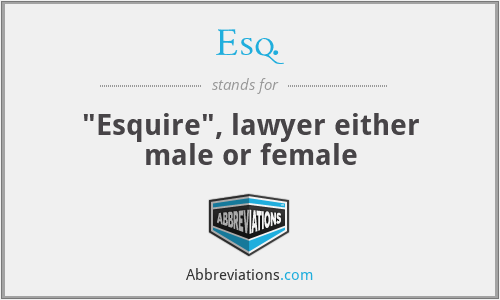What does Esq. mean in Law & Legal?
This page is about the meanings of the acronym/abbreviation/shorthand Esq. in the Governmental field in general and in the Law & Legal terminology in particular.
Submitted by agnm on December 28, 2011
Translation
Find a translation for "Esquire", lawyer either male or female in other languages:
Select another language:
- - Select -
- 简体中文 (Chinese - Simplified)
- 繁體中文 (Chinese - Traditional)
- Español (Spanish)
- Esperanto (Esperanto)
- 日本語 (Japanese)
- Português (Portuguese)
- Deutsch (German)
- العربية (Arabic)
- Français (French)
- Русский (Russian)
- ಕನ್ನಡ (Kannada)
- 한국어 (Korean)
- עברית (Hebrew)
- Gaeilge (Irish)
- Українська (Ukrainian)
- اردو (Urdu)
- Magyar (Hungarian)
- मानक हिन्दी (Hindi)
- Indonesia (Indonesian)
- Italiano (Italian)
- தமிழ் (Tamil)
- Türkçe (Turkish)
- తెలుగు (Telugu)
- ภาษาไทย (Thai)
- Tiếng Việt (Vietnamese)
- Čeština (Czech)
- Polski (Polish)
- Bahasa Indonesia (Indonesian)
- Românește (Romanian)
- Nederlands (Dutch)
- Ελληνικά (Greek)
- Latinum (Latin)
- Svenska (Swedish)
- Dansk (Danish)
- Suomi (Finnish)
- فارسی (Persian)
- ייִדיש (Yiddish)
- հայերեն (Armenian)
- Norsk (Norwegian)
- English (English)
Definition
What does Esq. mean?
- esq.
- Esquire (, US also ; abbreviated Esq.) is usually a courtesy title. In the United Kingdom, esquire historically was a title of respect accorded to men of higher social rank, particularly members of the landed gentry above the rank of gentleman and below the rank of knight. Some sources cite that the title was bestowed on "candidates for knighthood in England," and even used with respect to other dignitaries, such as justices of the peace, sheriffs, and sergeants.According to research by a New York City Bar Association committee, in the United States, esquire over time came to refer "commonly and exclusively" to lawyers, but how that happened is unclear. The only certainty, the committee stated, is that "based on common usage it is fair to state that if the title appears after a person’s name, that person may be presumed to be a lawyer". The 1826 edition of William Blackstone's Commentaries on the Laws of England reiterated that "the title should be limited to those only who bear an office of trust under the Crown and who are styled esquires by the king in their commissions and appointments; and all, I conceive, who are once honoured by the king with the title of esquire have a right to that distinction for life."By the early 20th century, however, esquire was being used as a general courtesy title for any man in a formal setting, with no precise significance, usually as a suffix to his name, and commonly with initials only. It was never used in a salutation. For example, a letter from a bank or firm of solicitors would be addressed to "T. J. Smith, Esq.", but the salutation would be "Dear Mr. Smith". The use of esquire began to die out in the 1970s because the automatic generation of correspondence using names and addresses stored in computer databases encouraged the use of names in a standard format with prefixed titles only. In the United Kingdom today, esquire is still occasionally used as a written style of address in formal or professional correspondence. In certain formal contexts, it remains an indication of a social status that is recognised in the order of precedence. In the legal profession, the title is available for barristers who have achieved the rank of King’s Counsel because they are designated as esquire on their letters patent, but the name of every male (but not female) barrister will be followed by 'Esquire' painted on the wig tins provided by Ede & Ravenscroft, the traditional suppliers, and this reflects a long-standing contention by members of the Bar that they are entitled to be designated esquires by virtue of their profession (see references to Boutell and Parker from the nineteenth century, below). In the United States, esquire is used by some lawyers in a departure from traditional use. In letters, these lawyers will ask to be addressed by adding the suffix esquire (abbreviated Esq.), preceded by a comma, after the lawyer's full name.
Embed
Citation
Use the citation below to add this abbreviation to your bibliography:
Style:MLAChicagoAPA
"Esq.." Abbreviations.com. STANDS4 LLC, 2024. Web. 7 May 2024. <https://www.abbreviations.com/term/1388660>.



Discuss this Esq. abbreviation with the community:
Report Comment
We're doing our best to make sure our content is useful, accurate and safe.
If by any chance you spot an inappropriate comment while navigating through our website please use this form to let us know, and we'll take care of it shortly.
Attachment
You need to be logged in to favorite.
Log In